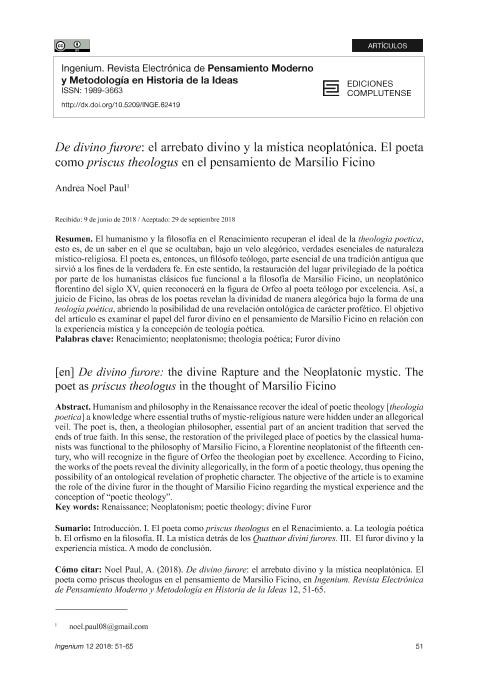Mostrar el registro sencillo del ítem
dc.contributor.author
Paul, Andrea María Noel

dc.date.available
2020-04-28T16:17:48Z
dc.date.issued
2018-12
dc.identifier.citation
Paul, Andrea María Noel; De divino furore: el arrebato divino y la mística neoplatónica. El poeta como priscus theologus en el pensamiento de Marsilio Ficino; Universidad Complutense de Madrid; Ingenium. Revista Electrónica de Pensamiento Moderno y Metodología en Historia de las Ideas; 12; 12-2018; 1-15
dc.identifier.issn
1989-3663
dc.identifier.uri
http://hdl.handle.net/11336/103778
dc.description.abstract
El humanismo y la filosofía en el Renacimiento recuperan el ideal de la theologia poetica, esto es, de un saber en el que se ocultaban, bajo un velo alegórico, verdades esenciales de naturaleza místico-religiosa. El poeta es, entonces, un filósofo teólogo, parte esencial de una tradición antigua que sirvió a los fines de la verdadera fe. En este sentido, la restauración del lugar privilegiado de la poética por parte de los humanistas clásicos fue funcional a la filosofía de Marsilio Ficino, un neoplatónico florentino del siglo XV, quien reconocerá en la figura de Orfeo al poeta teólogo por excelencia. Así, a juicio de Ficino, las obras de los poetas revelan la divinidad de manera alegórica bajo la forma de una teología poética, abriendo la posibilidad de una revelación ontológica de carácter profético. El objetivo del artículo es examinar el papel del furor divino en el pensamiento de Marsilio Ficino en relación con la experiencia mística y la concepción de teología poética.
dc.description.abstract
Humanism and philosophy in the Renaissance recover the ideal of poetic theology [theologia poetica] a knowledge where essential truths of mystic-religious nature were hidden under an allegorical veil. The poet is, then, a theologian philosopher, essential part of an ancient tradition that served the ends of true faith. In this sense, the restoration of the privileged place of poetics by the classical humanists was functional to the philosophy of Marsilio Ficino, a Florentine neoplatonist of the fifteenth century, who will recognize in the figure of Orfeo the theologian poet by excellence. According to Ficino, the works of the poets reveal the divinity allegorically, in the form of a poetic theology, thus opening the possibility of an ontological revelation of prophetic character. The objective of the article is to examine the role of the divine furor in the thought of Marsilio Ficino regarding the mystical experience and the conception of “poetic theology".
dc.format
application/pdf
dc.language.iso
spa
dc.publisher
Universidad Complutense de Madrid

dc.rights
info:eu-repo/semantics/openAccess
dc.rights.uri
https://creativecommons.org/licenses/by/2.5/ar/
dc.subject
theologia poética
dc.subject
NEOPLATONISMO
dc.subject
RENACIMIENTO
dc.subject
FUROR DIVINO
dc.subject.classification
Otras Filosofía, Étnica y Religión

dc.subject.classification
Filosofía, Ética y Religión

dc.subject.classification
HUMANIDADES

dc.title
De divino furore: el arrebato divino y la mística neoplatónica. El poeta como priscus theologus en el pensamiento de Marsilio Ficino
dc.title
De divino furore: the divine Rapture and the Neoplatonic mystic. The poet as priscus theologus in the thought of Marsilio Ficino
dc.type
info:eu-repo/semantics/article
dc.type
info:ar-repo/semantics/artículo
dc.type
info:eu-repo/semantics/publishedVersion
dc.date.updated
2020-04-28T14:16:24Z
dc.journal.volume
12
dc.journal.pagination
1-15
dc.journal.pais
España

dc.journal.ciudad
Madrid
dc.description.fil
Fil: Paul, Andrea María Noel. Consejo Nacional de Investigaciones Científicas y Técnicas; Argentina. Universidad Nacional de General Sarmiento. Instituto de Ciencias; Argentina
dc.journal.title
Ingenium. Revista Electrónica de Pensamiento Moderno y Metodología en Historia de las Ideas
dc.relation.alternativeid
info:eu-repo/semantics/altIdentifier/url/https://revistas.ucm.es/index.php/INGE/article/view/62419
dc.relation.alternativeid
info:eu-repo/semantics/altIdentifier/doi/http://dx.doi.org/10.5209/INGE.62419
Archivos asociados
